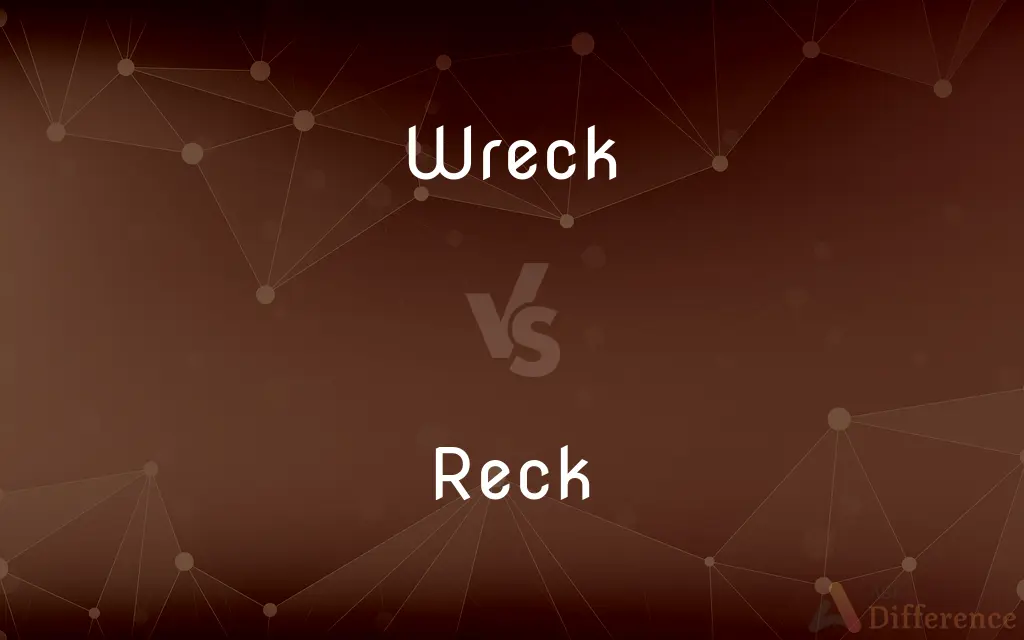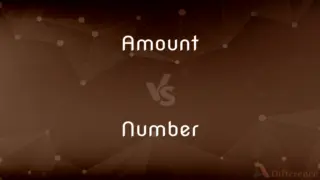Wreck vs. Reck — What's the Difference?
By Maham Liaqat & Fiza Rafique — Updated on March 11, 2024
Wreck refers to the destruction or ruin of something, often used for vehicles or structures, while reck is an archaic term meaning to care or have concern for something.

Difference Between Wreck and Reck
Table of Contents
ADVERTISEMENT
Key Differences
Wreck involves physical damage or the state of something being destroyed, such as a car wreck or a shipwreck, highlighting the aftermath of a catastrophic event or accident. It can be used both as a noun, indicating the remains or state of what has been destroyed, and as a verb, referring to the act of causing destruction. Reck, on the other hand, is rarely used in modern English and when it does appear, it's often in the expression "to reck not" or "reckless," meaning not to care or to be without concern, respectively.
The term wreck can apply to a wide range of scenarios beyond vehicles and structures, including the figurative sense of personal ruin or failure, as in "to wreck one's chances." Reck, in contrast, is almost exclusively seen in historical or literary contexts, conveying a sense of regard or consideration for something, which is now considered outdated.
Wreck implies a tangible change, often negative, that is visible or physically manifest, such as the remains of a crashed car or a dilapidated building. Reck's usage, being largely obsolete, is more abstract, dealing with the internal state of mind or attitude towards something, such as caring or having regard for consequences.
In modern contexts, wreck is commonly used and understood, reflecting physical destruction or ruin. Reck, due to its archaic nature, might not be recognized by most speakers and is primarily encountered in literature or expressions that have retained old English terms, like "reckless."
The evolution of language has seen wreck maintain its relevance, adapting to various contexts that involve damage or destruction. Reck, however, has not transitioned into contemporary usage and remains a linguistic relic, with its essence mostly preserved in the word "reckless," which denotes a lack of care or heedlessness.
ADVERTISEMENT
Comparison Chart
Definition
Destruction or ruin of something, especially in physical terms.
Archaic term for caring or having concern.
Usage
Common in modern English, both as a noun and a verb.
Rarely used in modern English, mostly seen in historical or literary contexts.
Context
Can refer to vehicles, structures, or even personal failure.
Primarily used in the expression "to reck not" or "reckless."
Implication
Physical damage or ruin.
Concern or regard for something, often in the sense of lacking it.
Modern Relevance
Frequently used and understood in contemporary language.
Largely obsolete, with relevance mostly in the term "reckless."
Compare with Definitions
Wreck
Applies broadly to physical damage or failure.
The financial crisis was a wreck for the company's profits.
Reck
Now rare, seen in older English texts or expressions.
The phrase to reck not signifies a disregard or lack of concern.
Wreck
The destruction or ruin of something, often a vehicle or structure.
The hurricane left a trail of wreck and devastation in its path.
Reck
An archaic term meaning to care for or have concern.
In times past, one might say I reck not of your threats.
Wreck
Indicates tangible damage or destruction.
The collision was a total wreck, leaving the car beyond repair.
Reck
Literary or historical, rarely used in casual conversation.
To reck or not reflects an archaic dilemma of caring.
Wreck
Often associated with accidents or disasters.
Divers explored the ancient shipwreck off the coast.
Reck
Mostly obsolete, except in the word "reckless."
Her reckless behavior indicated she recks not for the rules.
Wreck
Commonly used in everyday language.
His reckless driving almost ended in a wreck.
Reck
Concern or regard, often in the context of lacking it.
His reckless abandon showed he recks little for the consequences.
Wreck
The destruction of a ship at sea; a shipwreck
The survivors of the wreck
Reck
Reck is a surname. It may refer to: Friedrich Reck (1884-1945), German author and opponent of Nazism Hans Reck (1886–1937), German volcanologist and paleontologist John Reck (1865–1951), American politician, mayor of Juneau, Alaska Lars Reck (born 1999), Danish footballer Oliver Reck (born 1965), German football goalkeeper Paulette Reck (born c.
Wreck
Something, especially a vehicle or building, that has been badly damaged or destroyed
The wreck of their marriage
The plane was reduced to a smouldering wreck
Reck
Pay heed to something
Ye reck not of lands or goods
Wreck
A person whose physical or mental health or strength has failed
The scandal left the family emotional wrecks
Reck
To take heed of or to have caution.
Wreck
Cause the destruction of (a ship) by sinking or breaking up
He was drowned when his ship was wrecked
Reck
To make account of; to care for; to heed, regard, consider.
Wreck
Destroy or severely damage (a structure, vehicle, or similar)
The blast wrecked 100 houses
Reck
To concern, to be important or earnest.
2=Hit ne recketh! (= It recks not!)
Wreck
Engage in breaking up badly damaged vehicles or demolishing old buildings to obtain usable spares or scrap.
Reck
To think.
Wreck
The act of destroying or the state of being destroyed; destruction
"The filmmaker ... was hardly the first person to blame misguided agriculture for the wreck of the plains" (Timothy Egan).
Reck
To make account of; to care for; to heed; to regard.
This son of mine not recking danger.
And may you better reck the redeThan ever did the adviser.
Wreck
Accidental destruction of a ship; a shipwreck.
Reck
To concern; - used impersonally.
What recks it them?
Wreck
The stranded hulk of a severely damaged ship.
Reck
To make account; to take heed; to care; to mind; - often followed by of.
Then reck I not, when I have lost my life.
I reck not though I end my life to-day.
Of me she recks not, nor my vain desire.
Wreck
Fragments of a ship or its cargo cast ashore by the sea after a shipwreck; wreckage.
Wreck
An automobile or railroad collision or accident
Witnessed a wreck on the highway.
Wreck
The remains of something that has been wrecked, especially an automobile that has crashed
Walked away unharmed from the wreck.
Wreck
Something that is dilapidated or worn out
Still driving that wreck of a car.
Living in a wreck of a house.
Wreck
A person who is physically or mentally worn out.
Wreck
To cause the destruction of in a collision
Wrecked the car by hitting a tree.
Wreck
To dismantle or raze; tear down.
Wreck
To cause to undergo ruin or disaster
An argument that wrecked their friendship. See Usage Note at wreak.
Wreck
To suffer destruction or ruin; become wrecked
A ship that wrecked on the rocks.
Wreck
(Informal) To experience or cause an accident in which the vehicle one is riding in is badly damaged
They were speeding over 70 miles an hour when they wrecked.
Wreck
To work as a wrecker.
Wreck
The remains of something that has been severely damaged or worn down.
Wreck
An event in which something is damaged through collision.
Wreck
A shipwreck: an event in which a ship is heavily damaged or destroyed.
Wreck
Goods, etc. cast ashore by the sea after a shipwreck.
Wreck
(ornithology) A large number of birds that have been brought to the ground, injured or dead, by extremely adverse weather.
Wreck
(transitive) To ruin or dilapidate.
Wreck
To dismantle wrecked vehicles or other objects, to reclaim any useful parts.
Wreck
(transitive) To involve in a wreck; hence, to cause to suffer ruin; to balk of success, and bring disaster on.
Wreck
(intransitive) To be involved in a wreck; to be damaged or destroyed.
Wreck
See 2d & 3d Wreak.
Wreck
To destroy, disable, or seriously damage, as a vessel, by driving it against the shore or on rocks, by causing it to become unseaworthy, to founder, or the like; to shipwreck.
Supposing that they saw the king's ship wrecked.
Wreck
To bring wreck or ruin upon by any kind of violence; to destroy, as a railroad train.
Wreck
To involve in a wreck; hence, to cause to suffer ruin; to balk of success, and bring disaster on.
Weak and envied, if they should conspire,They wreck themselves.
Wreck
To suffer wreck or ruin.
Wreck
To work upon a wreck, as in saving property or lives, or in plundering.
Wreck
The destruction or injury of a vessel by being cast on shore, or on rocks, or by being disabled or sunk by the force of winds or waves; shipwreck.
Hard and obstinateAs is a rock amidst the raging floods,'Gainst which a ship, of succor desolate,Doth suffer wreck, both of herself and goods.
Wreck
Destruction or injury of anything, especially by violence; ruin; as, the wreck of a railroad train.
The wreck of matter and the crush of worlds.
Its intellectual life was thus able to go on amidst the wreck of its political life.
Wreck
The ruins of a ship stranded; a ship dashed against rocks or land, and broken, or otherwise rendered useless, by violence and fracture; as, they burned the wreck.
Wreck
The remain of anything ruined or fatally injured.
To the fair haven of my native home,The wreck of what I was, fatigued I come.
Wreck
Goods, etc., which, after a shipwreck, are cast upon the land by the sea.
Wreck
Something or someone that has suffered ruin or dilapidation;
The house was a wreck when they bought it
Thanks to that quack I am a human wreck
Wreck
An accident that destroys a ship at sea
Wreck
A serious accident (usually involving one or more vehicles);
They are still investigating the crash of the TWA plane
Wreck
A ship that has been destroyed at sea
Wreck
Smash or break forcefully;
The kid busted up the car
Common Curiosities
Can reck be used in contemporary language?
Reck is mostly obsolete, but its essence lives on in the term "reckless," meaning without care.
What does reck mean?
Reck is an archaic term that means to care for or have concern, rarely used in modern English.
How does the term reckless relate to reck?
Reckless derives from "reck," implying a lack of concern or care, essentially meaning to act without recking.
Why is it important to distinguish between terms like wreck and reck?
Distinguishing between them is essential for clear communication and understanding, especially given their differing meanings and relevancies.
What does wreck mean?
Wreck refers to the destruction or substantial damage of something, often visible and tangible.
Is wreck only related to physical objects?
While commonly associated with physical objects like cars or buildings, wreck can also refer to personal or abstract failures.
How is wreck used in a sentence?
"The car accident caused a complete wreck, leaving the vehicle in ruins."
Can something be a wreck without being completely destroyed?
Yes, something can be referred to as a wreck if it's significantly damaged or impaired, not necessarily destroyed.
What's the significance of understanding old terms like reck?
Understanding terms like reck can enrich one's knowledge of language evolution and literary heritage.
Is it correct to use reck in modern writing?
While technically correct, using reck in modern writing may confuse readers due to its archaic nature.
How does the meaning of wreck evolve in different contexts?
In different contexts, wreck can signify varying degrees and types of damage, from physical to metaphorical.
What is the importance of context in understanding the use of wreck and reck?
Context is crucial as it determines the specific meaning and implication of these terms, especially given their differing usages.
How can the concept of wreck be applied in a metaphorical sense?
Metaphorically, wreck can describe situations of ruin or failure, such as a relationship wreck or a career wreck.
What role does historical language study play in understanding terms like reck?
It helps in appreciating the depth and evolution of language, revealing how words like reck inform contemporary terms and expressions.
Can wreck have a positive connotation?
Generally, wreck has a negative connotation, but it can be used positively in contexts where destruction leads to beneficial outcomes.
Share Your Discovery

Previous Comparison
Flannel vs. Flannelette
Next Comparison
Amount vs. NumberAuthor Spotlight
Written by
Maham LiaqatCo-written by
Fiza RafiqueFiza Rafique is a skilled content writer at AskDifference.com, where she meticulously refines and enhances written pieces. Drawing from her vast editorial expertise, Fiza ensures clarity, accuracy, and precision in every article. Passionate about language, she continually seeks to elevate the quality of content for readers worldwide.














































